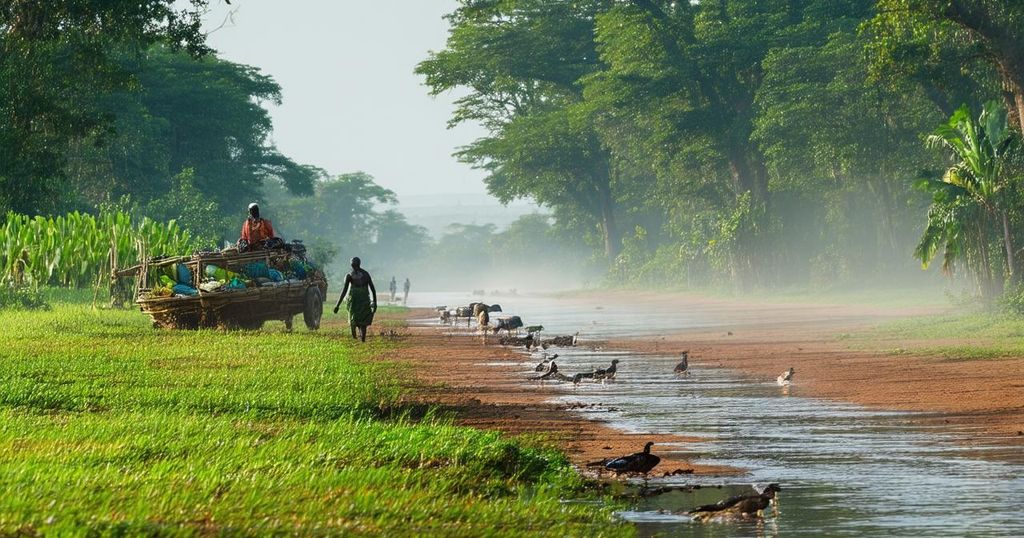The Central African Republic is trapped in a cycle of underdevelopment, state fragility, and climate change vulnerability. With a low GDP per capita and a significant portion of the population living in poverty, CAR faces daunting economic challenges. Political instability further complicates governance and social cohesion, while the reliance on climate-sensitive sectors such as agriculture heightens risk to livelihoods. The CCDR highlights the urgent need for a multi-faceted strategy addressing these intertwined issues to foster resilience and sustainable development.
The Central African Republic (CAR) is ensnared in a detrimental cycle characterized by profound underdevelopment, state fragility, and heightened vulnerability to climate change, as articulated in the Central African Republic Climate and Development Report (CCDR). This scenario is substantiated by empirical data underscoring the significant hurdles that CAR must navigate. Economically, the CAR grapples with alarming underdevelopment, as reflected in one of the lowest GDP per capita figures worldwide, recorded at merely $495 in 2019. Furthermore, the Human Development Index (HDI) positions CAR among the lowest globally, indicative of critical deficits in health, education, and overall living standards. For instance, it is foreseen that a child born in CAR today will realize a mere 29% of their productive potential should they receive the full spectrum of education and healthcare. The poverty levels are particularly stark, with around 70% of the population subsisting below the poverty threshold. Moreover, from 2018 to 2021, an overwhelming 90% of households encountered significant shocks, largely attributed to armed conflict (54%) and climate-related incidents (27%). On a political front, CAR’s fragility is exacerbated by a tumultuous history marked by persistent upheaval and conflict, severely undermining governance structures and disrupting social cohesion. Since gaining independence in 1960, the nation has faced recurrent violence and instability, eroding its governance capabilities. This volatility manifests within societal structures, often leading to tensions that culminate in violence, resulting in the displacement of numerous individuals and the fragmentation of communities. Furthermore, urban areas have not developed resiliently or inclusively enough to serve as effective refuges for their populations, thereby limiting opportunities. Enviornmentally, over 80% of the population relies on agriculture and forestry, both of which are notably susceptible to climate variability. The CCDR underscores that changing rainfall patterns and the rise in extreme weather events pose serious threats to water and food security, along with livelihoods. Numerous reports emphasize that erratic rainfall severely disrupts agricultural production, exacerbating food insecurity and jeopardizing the national economy. Additionally, CAR’s vast river systems and rich forest cover are under threat from both climate change and desertification, putting at risk vital natural resources. These interlinked challenges create a complex network that perpetuates economic, social, and environmental stagnation. The nexus of underdevelopment, political instability, and climate vulnerability severely constrains CAR’s ability to implement effective strategies for climate resilience and adaptation. The deficiencies in governance further inhibit the execution of robust policies and impede necessary international collaboration. Consequently, to extricate itself from this cycle of stagnation, CAR must adopt a holistic strategy that tackles both the root causes and the manifestations of its challenges. This entails targeted investments, fortification of institutions, and innovative policy reforms. Absent a multifaceted and integrated approach acknowledging both sectoral issues and spatial dynamics, CAR risks deeper entrenchment in this cycle, posing grave consequences for the well-being of its populace and the country’s future developmental trajectory.
The Central African Republic is situated in a region where underdevelopment, political instability, and climate change intricately intertwine to create significant obstacles towards progress. CAR’s history of unrest and volatile governance has led to dire socio-economic conditions, leaving a majority of its population vulnerable to both internal and external shocks, notably those related to climate change. The CCDR serves as a crucial analysis of these interconnected challenges, offering insights into the pressing need for a strategic response to foster resilience and sustainable development in the face of such adversity.
In conclusion, the Central African Republic is facing significant hurdles stemming from a vicious cycle of underdevelopment, state fragility, and climate vulnerability. Addressing these interrelated challenges demands a cohesive strategy that encompasses targeted investments, institutional reinforcement, and comprehensive reforms. By adopting an integrated approach that recognizes the interconnected nature of these issues, CAR can aspire to break this cycle and pave the way towards a sustainable and resilient future for its population.
Original Source: reliefweb.int






